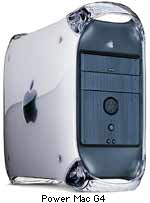China’s request for Apple’s new ‘supercomputer’ is in the mail.
If any group on earth deserves to get their hands on the new Apple Power Mac G4, it should certainly be Chinese-language newspaper designers. Thumbing through Hong Kong’s Apple (no relation) Daily and The Sun newspapers, one is constantly astounded by the computer-graphics muscle applied to these garishly colorful, font-frenzied publications. And the G4, in keeping with Apple’s strategy of targeting its top-of-the-line machines at computer graphics professionals, looks to be a Great Leap Forward for Hong Kong newsies. Apple claims it can run Adobe Photoshop, that essential desktop publishing application, at twice the speed of the fastest Pentium PC’s.

But when the local design community gathered in Hong Kong Wednesday for the regional debut of Apple’s refreshed product line, the G4 was missing in action. The new OS9 operating system was rolled out. So was the new iMac, in all its consumer-seducing colors. No G4s anywhere.
Blame not Steve Jobs. Apple’s interim CEO for life may have said at an industry conference in August that the machines “will be available in all freedom-loving countries,” but Jobs is not one to willingly cut himself off from potentially vast markets. It’s the U.S. government that has grounded the G4. The machine is apparently capable of performing more than one billion calculations per second, which by the U.S. export rulebook makes it a supercomputer as a strategic, and therefore export-restricted, technology.
David Moody, Apple’s senior director for worldwide product marketing, is not optimistic the situation will be remedied quickly. To get permission to airdrop G4s into “controlled destinations” — China, Vietnam, Pakistan, countries of the Middle East, Maghreb, the former Soviet Union, and several Eastern European countries — Apple has to lobby U.S. President Bill Clinton. The Clinton administration must then make a case before the U.S. Senate that current strategic technology definitions are outmoded as they relate to commercial desktop computers. The U.S. Senate — which is still mindful of export-restriction breaches in the sale of missile technology to China as well as the nuclear-secrets spy scandal — then must mull over the proposal. Moody says it won’t be known if the G4 will receive clearance until late January, at the earliest.
Apple maintains the export ban does not apply to the G4 because it is destined neither for the military nor for nuclear, chemical, biological, or missile applications — all expressly forbidden by U.S. Export Administration regulations. Clearly, computer power is advancing faster than the bureaucracy can account for it, and Apple, not to mention the Hong Kong press, is caught in the switches.
Handed lemons, Apple is making lemonade. The company’s advertising — such as a cheeky TV spot showing a G4 surrounded by U.S. tanks — gets a lot of mileage out of the export ban. “Boy, have we had fun with it,” says Moody. Here in Hong Kong, where we can view the ads but can’t buy the product, we’re finding it harder to chuckle.
Originally in Asiaweek Magazine, online at http://www.asiaweek.com/asiaweek/intelligence/9910/15/index.html. Site design also by Adam Connors.
Search for more Asiaweek articles, reviews and interviews.
